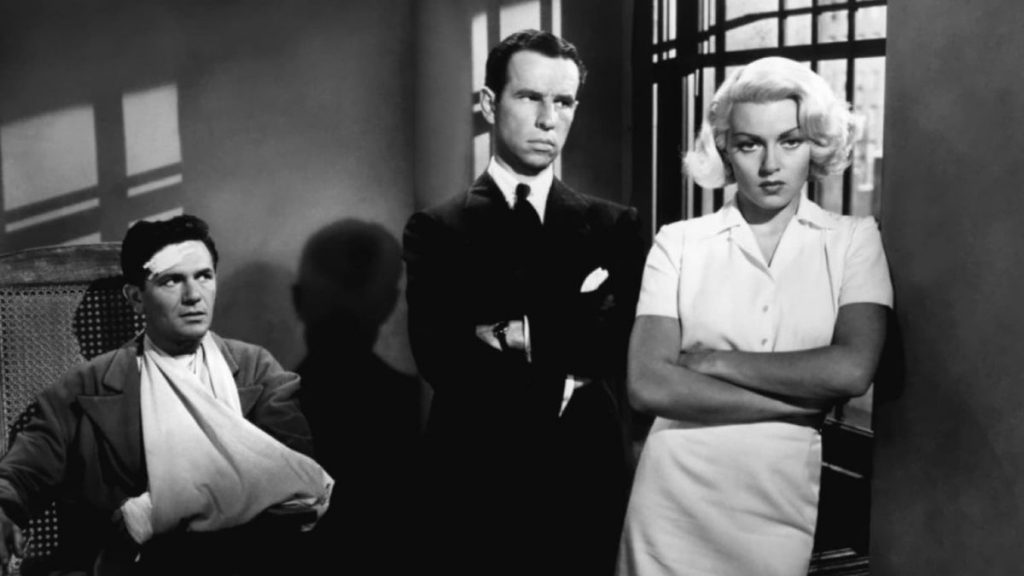To understand the dynamics of early postwar film noir, you can do worse than to start with MGM’s The Postman Always Rings Twice (1946), which is celebrating its 75th anniversary – and is best enjoyed in the heat of summer per its original release. This adaptation of James M. Cain’s 1934 crime novel of the same title (one of seven!) renders the corrupted hearts of its protagonists as blackly as contemporary industry censorship allowed. Played at high steam by John Garfield and Lana Turner, noir icons at their most iconic, the anti-hero and the femme fatale sizzle, their movie-star magnetism set off in high-styled black and white cinematography.
Driven inexorably by lust and greed, their criminality is harshly disciplined, but only after being exploited for 100 minutes of pleasure, in which the spectator thrills with their desires and the suspense of whether they’ll consummate their affair and murderous intentions, and whether they’ll be caught when they do. (According to Garfield biographer Robert Nott, the stars’ onscreen affair was consummated off-screen too.) There is a heady mix of tragic fatalism, moral relativism, and social criticism, the suggestion that capitalism perverts human souls. “Everything went dark,” says the lovers’ attempted murder victim. Describing his concussion, he might as well be describing the advent of noir, with its profound cynicism about the “American Way,” so ballyhooed during the war.
The Postman Always Rings Twice is representative early noir despite the deceptive brightness of its setting: the hill country outside Los Angeles. The film opens on Frank Chambers (Garfield), his fate overdetermined by that surname, his confessional voiceover, and the presence of The Law – in the form of a district attorney, with whom Frank has hitched a ride, and a motorcycle cop (both will reappear later). For good measure, director Tay Garnett also gives us a “Man Wanted” sign, literally advertising a job at the Twin Oaks filling station/lunch counter and figuratively forecasting Frank’s destiny, as does the film’s foreboding if cryptic title. A restless wanderer, Frank is about to be trapped, which we are told—in typical noir fashion—by so many striated shadows and by the entrance of Cora Smith (Turner), who grabs Frank by the gaze (with a typical POV shot of her high-heeled gams) and never lets go.
Cora is a noir “spider woman” par excellence (to use Janey Place’s term). Her unnatural phallic power is symbolized in lipsticks (intentionally dropped) and cigarettes (self-lit), her unnatural narcissism—at odds with gender norms dictating female subordination of will—symbolized by the mirror she uses to gaze at her own weaponized attractiveness. Like the sunny setting, the total whiteness of Cora’s hair and wardrobe (Garnett’s inspired brainchild) is a ruse. No innocent bride, Cora is white-hot, like the electric current that kills the cat dumb enough to walk into a fuse box. Trapped herself in marriage to a much older man, the Twin Oaks’ owner Nick (Cecil Kellaway), who keeps her working in the kitchen and fails to satisfy her sexually and financially, Cora will lure Frank into setting her free, regardless of the cost to him. Ambitious to “amount to something” and an increasingly skilled deceiver, she talks Frank into conspiring to murder Nick. Successful the second time around, at one hour into the film, the lovers spend the rest of it turning against, and then towards, each other—lather, rinse, repeat—until Karma and The Law punish them both, per the strictures of the Production Code.
This ending is also dictated by Cain’s novel, as is much of the film’s over-stuffed plot, more allegiant to its literary source than later postwar noirs, which would become more specifically cinematic. Part of this is attributable to noir’s incipiency, but another part is deference to Cain and his novel’s bestselling status, one of three to be adapted into early noirs, along with Mildred Pierce and Double Indemnity. Though MGM bought the rights to Postman in 1934, the studio delayed its adaptation for over a decade due to the Breen Office’s admonitions that the story was “unwholesome and thoroughly objectionable.”

Indeed, the novel is racy, detailing (how to commit) murder and (sadomasochistic) adulterous sex – along with various other crimes and crossings of geographical (read: moral) borders. In the novel, Frank regularly roams to Mexico and Nick (Papadakis, not Smith) is a thickly-accented Greek immigrant. Finally daring to adapt it, MGM got the push it needed with the success of Paramount’s Double Indemnity in 1944, which proved Cain’s potboilers could pass muster with the censors and sell at the box office. That said, Postman’s sexual heat would have to be tempered, waiting thirty-five years to be restored to original strength (and then some) in the 1981 adaptation written by David Mamet, directed by Bob Rafelson, starring Jack Nicholson and Jessica Lange.
For the iconography of postwar noir, though, the 1946 film version can’t be beat. Turner’s stark platinum bob, of course, is seared into cinematic history. But even more marvelous is her ambiguous performance. She keeps the viewer tantalizingly unsure: Is Cora’s Iowa-bred sweetness and affection for Frank genuine or feigned, and does she even know the difference? And while Turner’s own top-billed glamour sometimes gets in the way of playing Cora docile, the same glamour enhances the film’s moral relativism: the marital ‘enslavement’ of this goddess to a fat old drunk (who wants to make her his paralyzed sister’s nurse) seems the real crime.
Her co-star Garfield is pitch-perfect as the hardboiled anti-hero, only tough on the outside, soft and vulnerable at his core. (Garfield’s tragic biography—persecuted under the Hollywood Red Scare and dead of a heart attack by age 39—only heightens this effect). Despite his posturing, Frank proves no match for Cora. Though he is the film’s narrator, she increasingly out-talks him, exceeding his use of language and his (and the film’s) attempts to contain her as erotic object—a transgression of gender norms typical of noir. A “hell-cat” (Cain’s words), Cora strains against domestication, thus enacting (and thereby titillating) postwar anxieties about sexually and financially liberated women (Rosie the Riveters who’ve found they like riveting just fine). In contrast to Frank’s emasculation is Cora’s authoritative attorney, Arthur Keats (Hume Cronyn). Keats’ refrain is “I’m handling it,” and he certainly does handle Cora: “Listen, my girl,” he chastises her, “From now on, you speak only when you’re spoken to.” Real men keep their hell-cats on a leash, I guess.
So, grab some popcorn, and a big grain of salt for the outdated gender politics. This film has lasted, but the summer won’t.
“The Postman Always Rings Twice” is available for rental or purchase via the usual platforms.



